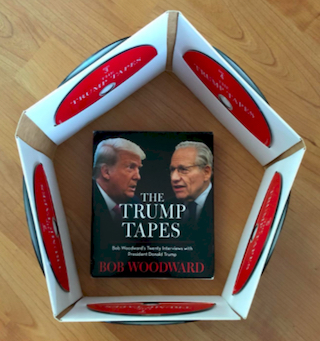

Donald Trump is suing journalist Bob Woodward and the publisher Simon and Schuster for $50 million, alleging that Woodward’s audiobook The Trump Tapes was released without prior authorisation. Woodward interviewed Trump nineteen times as research for his book Rage, and the audiobook features complete recordings of those interviews. Trump’s lawsuit, filed on 30th January, accuses Woodward of “systematic usurpation, manipulation, and exploitation of audio of President Trump”, and claims that the publication of the tapes violated Trump’s copyright.
In many of the interviews, Woodward tells Trump: “I’m turning on my tape recorder”, a reminder that these are on-the-record conversations being recorded with consent. He didn’t discuss the prospect of an audiobook with Trump, because he wasn’t required to do so. Woodward is legally entitled to release the tapes, because he—not Trump—recorded them. Just as the person who presses the camera shutter automatically assumes copyright of the resulting photograph, the person who presses ‘record’ owns the copyright of a sound recording (if the recording is made with permission).
In many of the interviews, Woodward tells Trump: “I’m turning on my tape recorder”, a reminder that these are on-the-record conversations being recorded with consent. He didn’t discuss the prospect of an audiobook with Trump, because he wasn’t required to do so. Woodward is legally entitled to release the tapes, because he—not Trump—recorded them. Just as the person who presses the camera shutter automatically assumes copyright of the resulting photograph, the person who presses ‘record’ owns the copyright of a sound recording (if the recording is made with permission).
